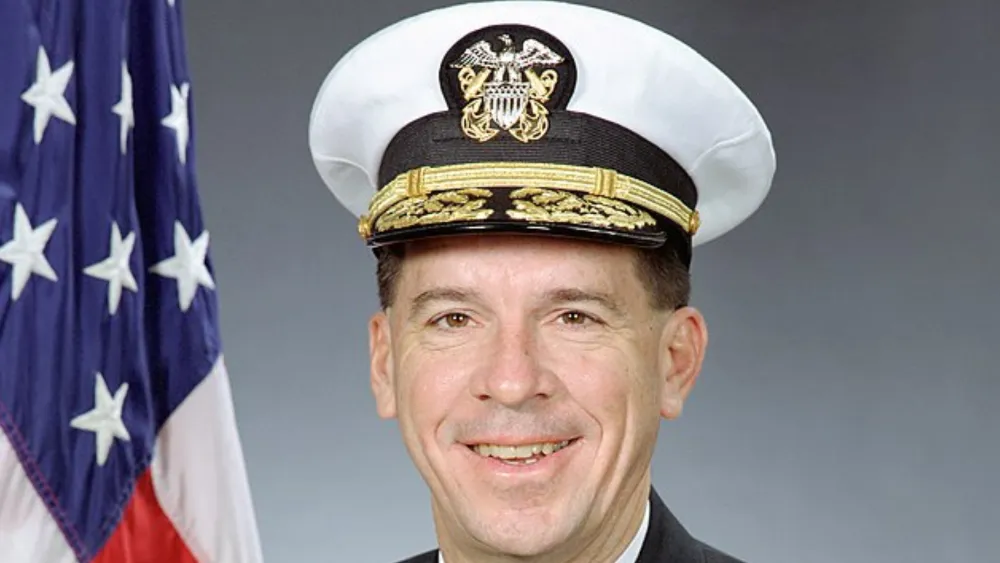Michael Mullen, a retired United States Navy admiral, held several distinguished positions during his impressive career. He served as the 28th Chief of Naval Operations from July 22, 2005, to September 29, 2007. Notably, he holds the distinction of being only the third officer in the Navy’s history to have received appointments to four different four-star assignments. These included the Commander, U.S. Naval Forces Europe, and Commander. Moreover, he was part of Allied Joint Force Command Naples from October 2004 to May 2005 and as the 32nd Vice Chief of Naval Operations from August 2003 to August 2004.
The Early Years of Michael Mullen
Michael Glenn Mullen was born on October 4, 1946, in Los Angeles, California, in a home filled with the echoes of patriotism and a deep respect for public service. He was the second of five children in a close-knit family.
Stories of his father’s service as a World War II Veteran instilled in him the values of duty, honor, and country from a young age. Mullen’s upbringing forged his character, teaching him that serving one’s nation was not merely an obligation but a profound privilege.
After being accepted in 1964, he started his academic career at the esteemed United States Naval Academy in Annapolis, Maryland. It is where his unquenchable curiosity and dedication to excellence started to show. As a midshipman, he immersed himself in the rigorous academic curriculum.
In 1968, Michael Mullen graduated with a Bachelor of Science in Naval Science. Thus, he began a path that would culminate in a lifelong commitment to the United States Navy.
His time at the Naval Academy marked the commencement of a remarkable journey filled with honor and leadership. Moreover, he had a deep-seated devotion to his country that would define his extraordinary career.
A Distinguished Naval Career
After graduating from the Naval Academy, Mullen went on a journey that would see him rise through the ranks. It made significant contributions to the U.S. Navy and the broader military establishment.
His early assignments included serving aboard the USS Collett (DD-730) and the USS Blandy (DD-943), where he gained invaluable experience and developed a strong foundation of naval skills.
Mullen’s career then took him to various positions of increasing responsibility. These are several important assignments in the Pentagon. Also, his achievements and leadership qualities were quickly recognized, and he continued to climb the ranks.
He eventually became the 28th Chief of Naval Operations in 2005, the highest-ranking officer in the U.S. Navy.
As Chief of Naval Operations, Mullen faced numerous challenges. He faced struggles adapting the Navy to the changing landscape of modern warfare. However, he strongly advocated for technological advancements. Furthermore, he also advocated for increased focus on counterterrorism, and a more flexible and agile Navy.
His tenure in this role earned him a reputation as a forward-thinking leader who was dedicated to the welfare of sailors and the security of the nation.
Chairman of the Joint Chiefs of Staff
Even before being appointed the highest rank in the Navy, Mullen showed remarkable leadership and strategic thinking abilities. He was the highest-ranking military officer in the United States. In this role, he advised the President, the Secretary of Defense, and the National Security Council on military matters.
During Mullen’s tenure as Chairman of the Joint Chiefs of Staff, he oversaw unprecedented challenges, including the ongoing wars in Afghanistan and Iraq.
Mullen faced unheard-of difficulties while serving as Chairman of the Joint Chiefs of Staff, including the ongoing conflicts in Afghanistan and Iraq. So, he played a key role in shaping U.S. military strategy in these conflicts and providing valuable advice on international security matters.
Mullen’s dedication to the welfare of troops on the ground earned him respect and admiration throughout the armed forces.
Mullen also played a crucial role in strengthening U.S. alliances and building relationships with international military leaders. His emphasis on diplomacy and collaboration was instrumental in advancing American interests on the global stage.
Michael Mullen: Advocating for Military Families
One of Michael Mullen’s enduring legacies is his commitment to the well-being of military families. He recognized the sacrifices of service members. Furthermore, their loved ones made and worked tirelessly to ensure they received the support and resources they needed.
Furthermore, his advocacy for increased funding for military healthcare, education, and support programs left a lasting impact on the lives of countless military families.
Mullen made an effort to raise awareness about the challenges faced by military families. These include frequent deployments and the strains of wartime service. So, it helped foster a sense of unity and support within the military community. His dedication to this cause endures through the Mullen Family Foundation. Therefore, it continues to provide support and resources to military families.
The Transition to Civilian Life: Mullen’s Retirement from Active Duty
After retiring from the United States Navy in November 2011, Mullen didn’t slow down. He joined the boards of General Motors and Sprint and became part of Bloomberg Philanthropies. He’s not just a passive member; he actively supports and gets involved with various non-profit organizations that help military Veterans. He helped their families with growth, development, recovery, and transitioning.
In addition to his work with these organizations, Mullen took on a teaching role. From 2012 to 2018, he taught National Security Decision-making and Policy at the Woodrow Wilson School of International and Public Affairs at Princeton University. This remarkable man also holds a master’s degree in operations research from the Naval Postgraduate School.

Michael Mullen and his Lasting Reminder
Michael Mullen, a retired U.S. Navy admiral, had a remarkable career that teaches us some down-to-earth lessons. He grew up with a strong sense of duty and patriotism, which reminds us that finding a purpose and staying committed to it can lead to exceptional success.
His time at the Naval Academy showed us that continuous learning and dedication to personal growth are necessary for achieving greatness in any field. Mullen’s journey through various roles on naval vessels highlights the importance of building a solid foundation.
It teaches us the value of gaining practical experience in our chosen fields. His advocacy for the welfare of military personnel and their families underscores the significance of caring for and supporting those we lead.
Finally, his post-retirement activities demonstrate that leadership and service don’t end with retirement. We can keep making a positive impact on the community.











